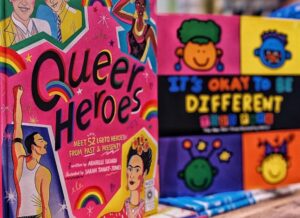Florida school board removes sexually explicit books from school libraries
A Florida school district voted to remove three sexually themed books from its school libraries, in accordance with Florida’s Parental Rights in Education law.
The controversy centered around And…

A Florida school district voted to remove three sexually themed books from its school libraries, in accordance with Florida’s Parental Rights in Education law.
The controversy centered around And Tango Makes Three, a book about two male penguins who adopt a female chick. The book was written by Justin Richardson, a clinical psychiatrist specializing in sexual development and parenting, and his husband, Peter Parnell. Like the fictional penguins, Richardson and Parnell share a daughter.
The Escambia County School Board voted 3-2 to remove the book, along with two others, All Boys Aren’t Blue and When Aidan Became a Brother.
All Boys Aren’t Blue contains sexually graphic and violent scenes. Its author, George M. Johnson, identifies as queer and non-binary. When Aidan Became a Brother is a story about a young girl who transitions into a boy and becomes an older sibling. Kyle Lukoff, the writer, also identifies as transgender.
Not everyone in attendance supported the move, but board member Kevin Adams reiterated that the decision only affected school libraries and doesn’t prohibit students from getting books from other sources.
“Go get the book if you want to but it’s just something that should not be in the school district,” Adams said. “We should be concentrated on the education of these students.”
Escambia public schools have an average math proficiency score of 41% and a reading score of 45%, both of which are 7 points lower than the Florida state average.
The author of And Tango Makes Three complained about the decision, claiming the board is violating the First Amendment.
“They’re targeting books that are depicting acceptance and warmth towards a homosexual family,” Richardson told The Daily Beast. “They’re simply not saying that because, I believe, they’re aware that it’s a violation of the First Amendment to remove a book from a public school library because you disagree with a message.”
However, the Supreme Court has previously ruled that “obscene” materials are not protected by the First Amendment. Whether or not content is obscene is determined by several factors, including community standards and whether it is excessively interested in sexual matters.
The Escambia school board also discussed its policies regarding Florida’s new Parental Rights in Education bill, signed by Gov. Ron DeSantis last year.
Although the board has already discussed 200 selections, the district has over 100,000 books in its collection that haven’t been reviewed.
Additionally, the superintendent has the authority to declare a book inappropriate, according to board chairman Paul Fetsko.
Ultimately, the board’s decision to remove certain books gives parents the ability to decide when and how to broach mature topics with their child, supporters say.
Childhood is “a wonderful time of life to not be burdened by things they are not ready to understand, feelings they don’t feel,” said community member, Keith Bowe. “We’re not banning the book, we’re letting the parents decide when it’s appropriate for that time.”



